General, Sir John Monash, Personal Files Book 22, 10 April - 1 June 1919- Part 6
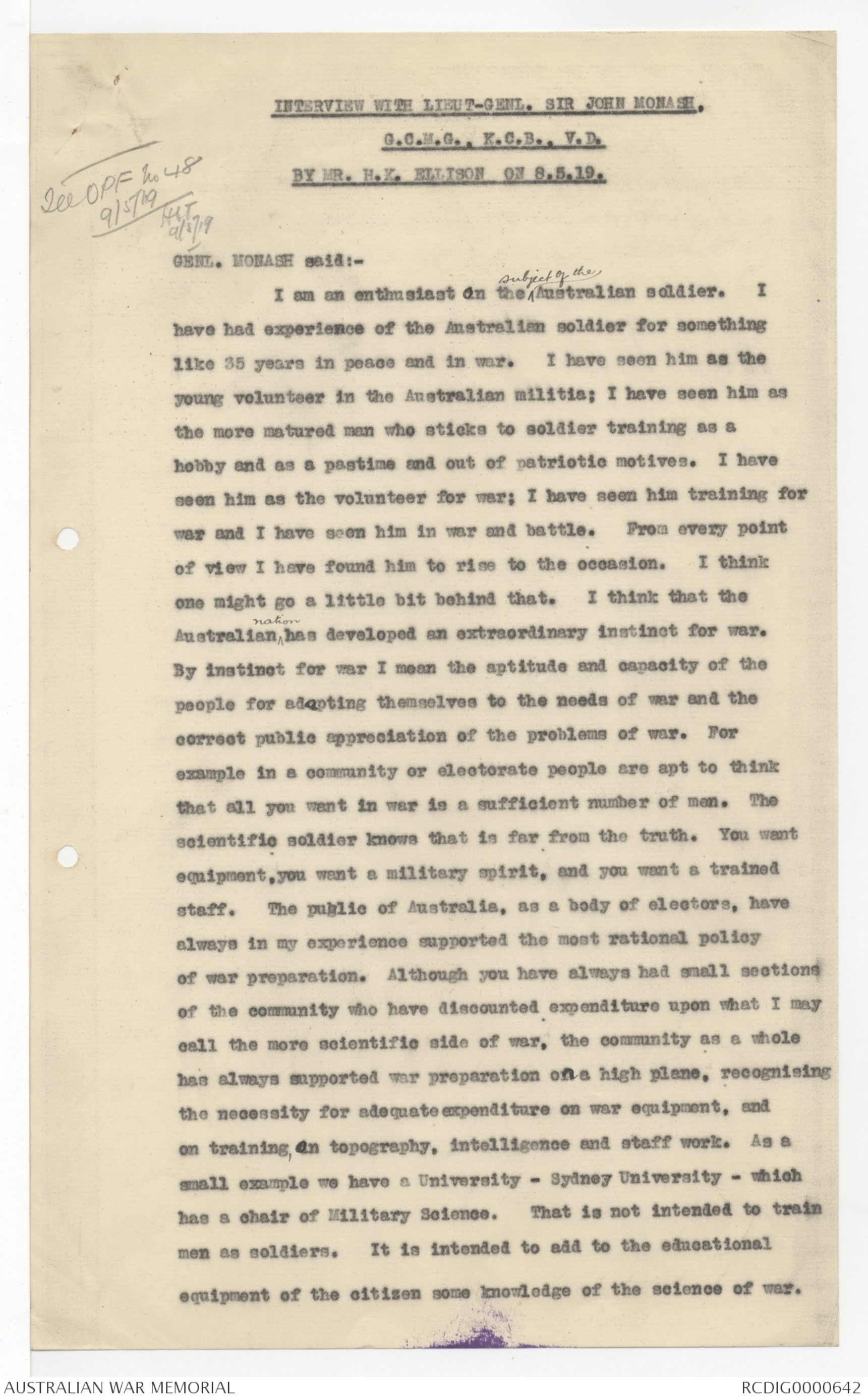
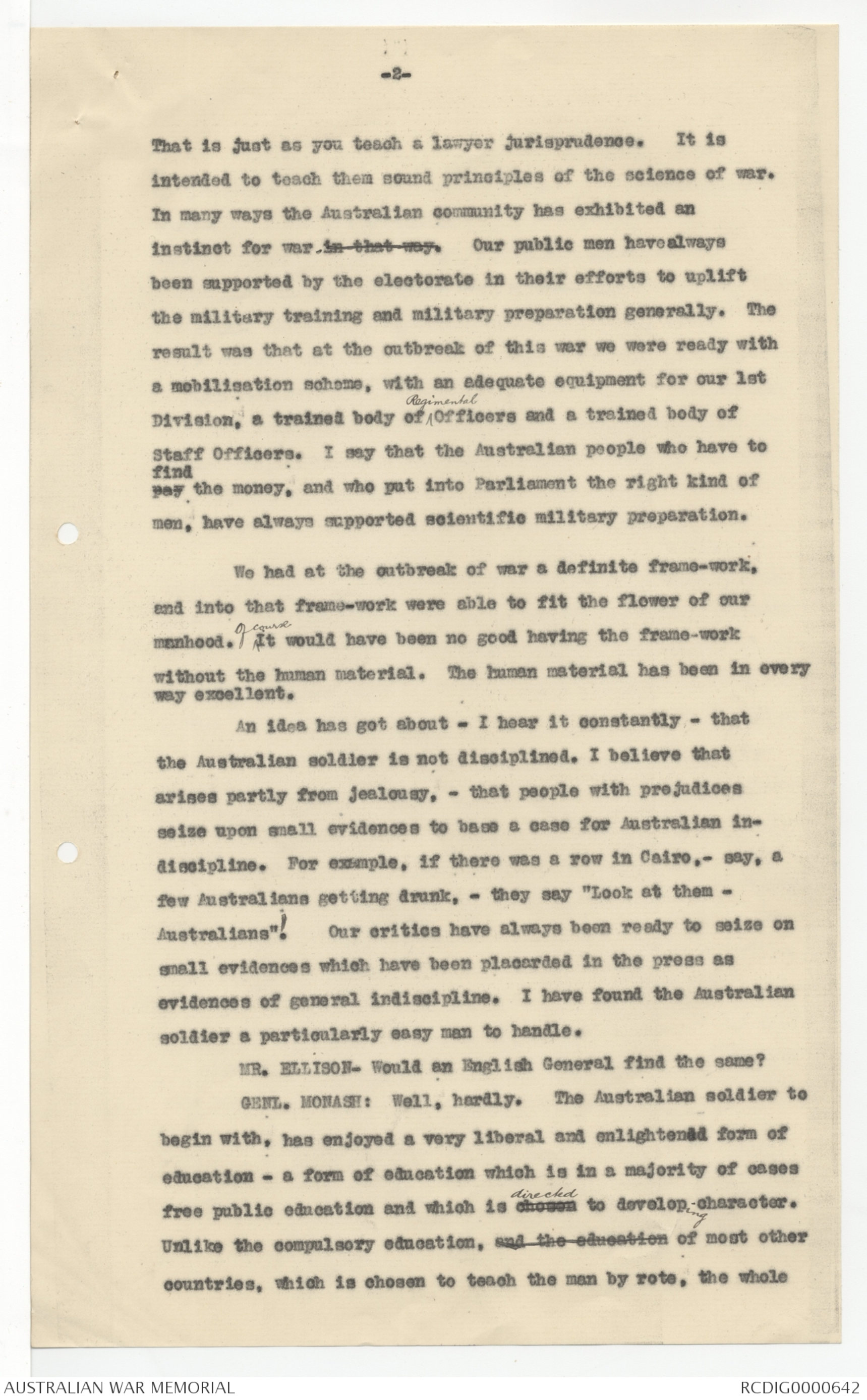
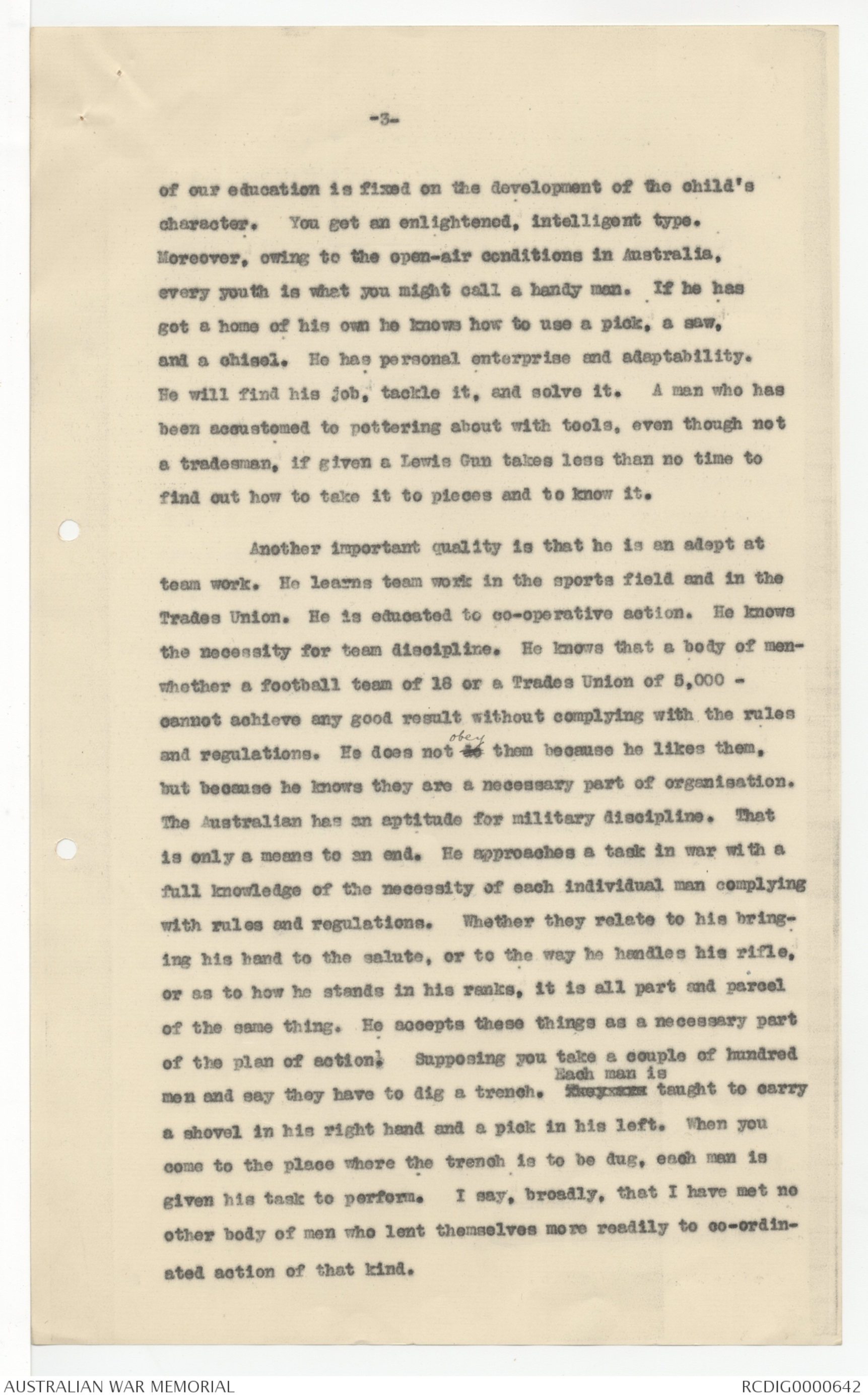
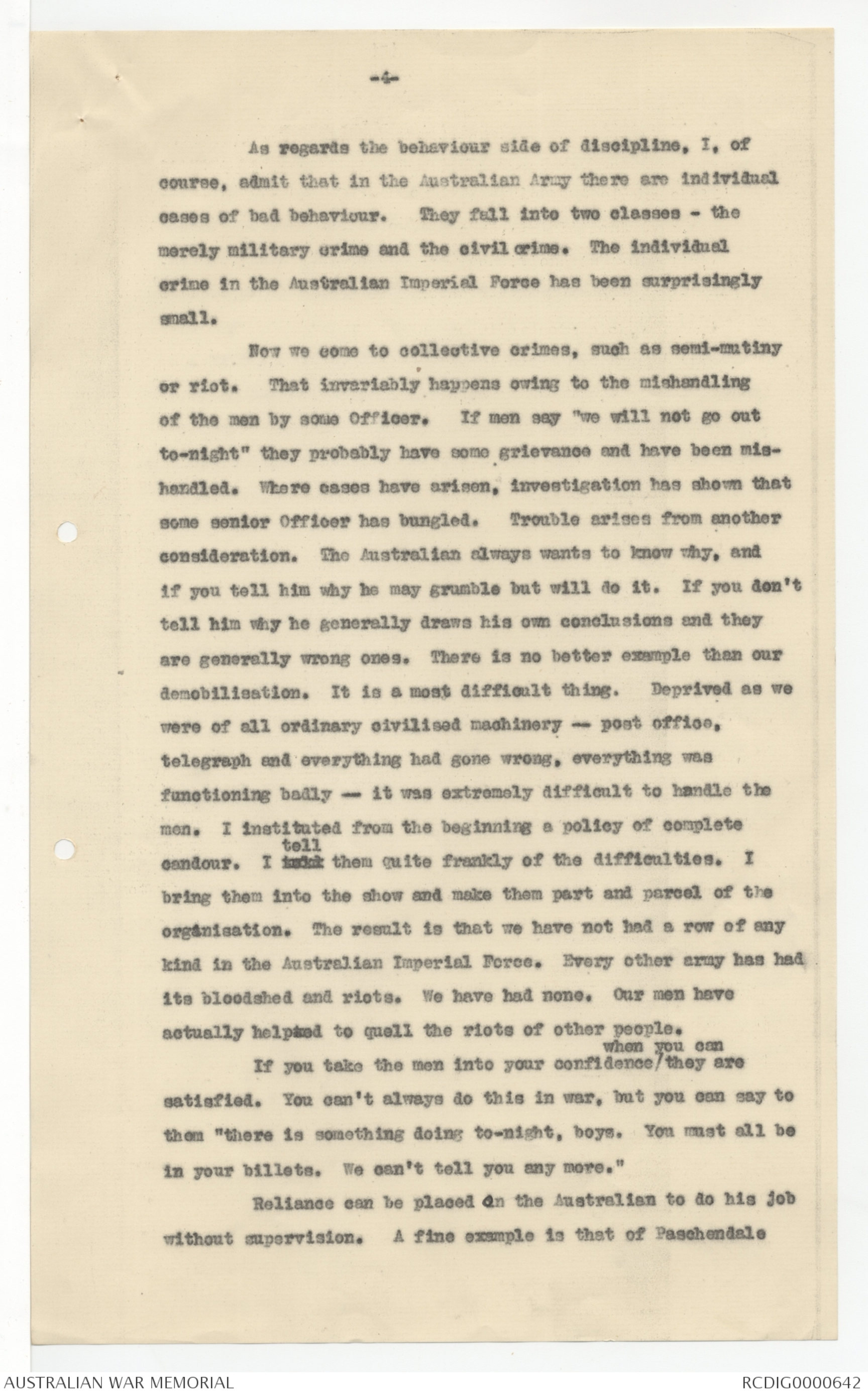
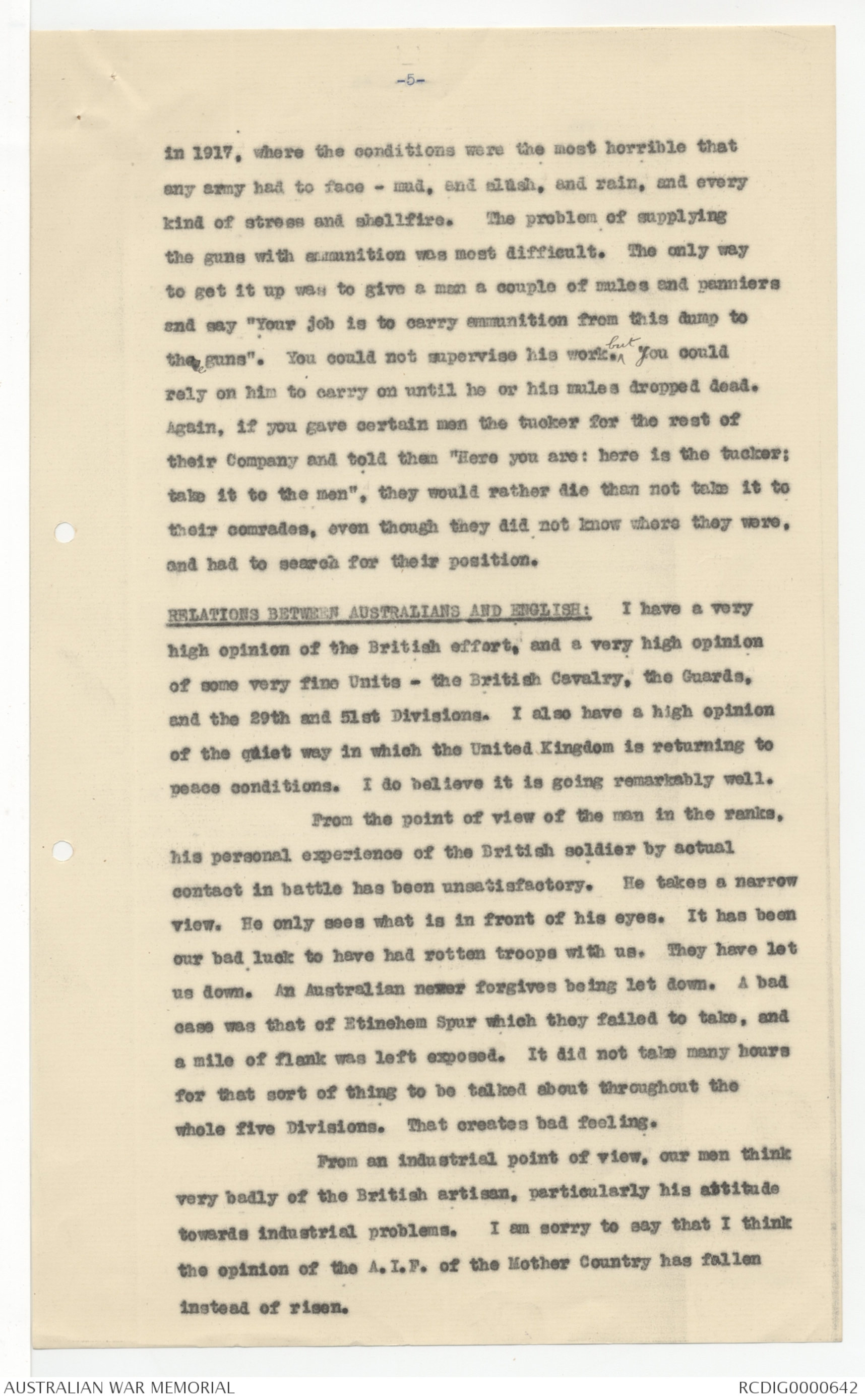
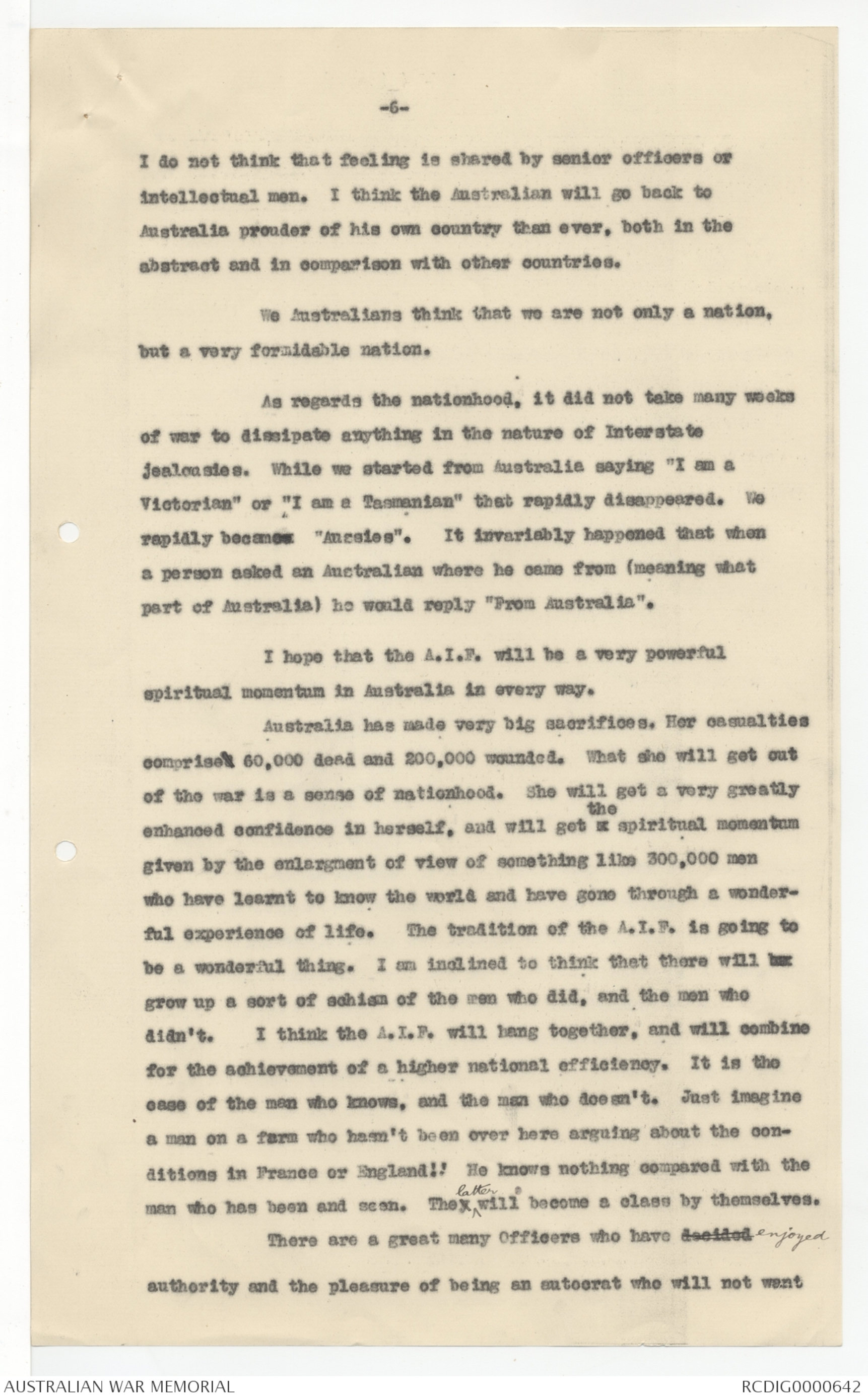
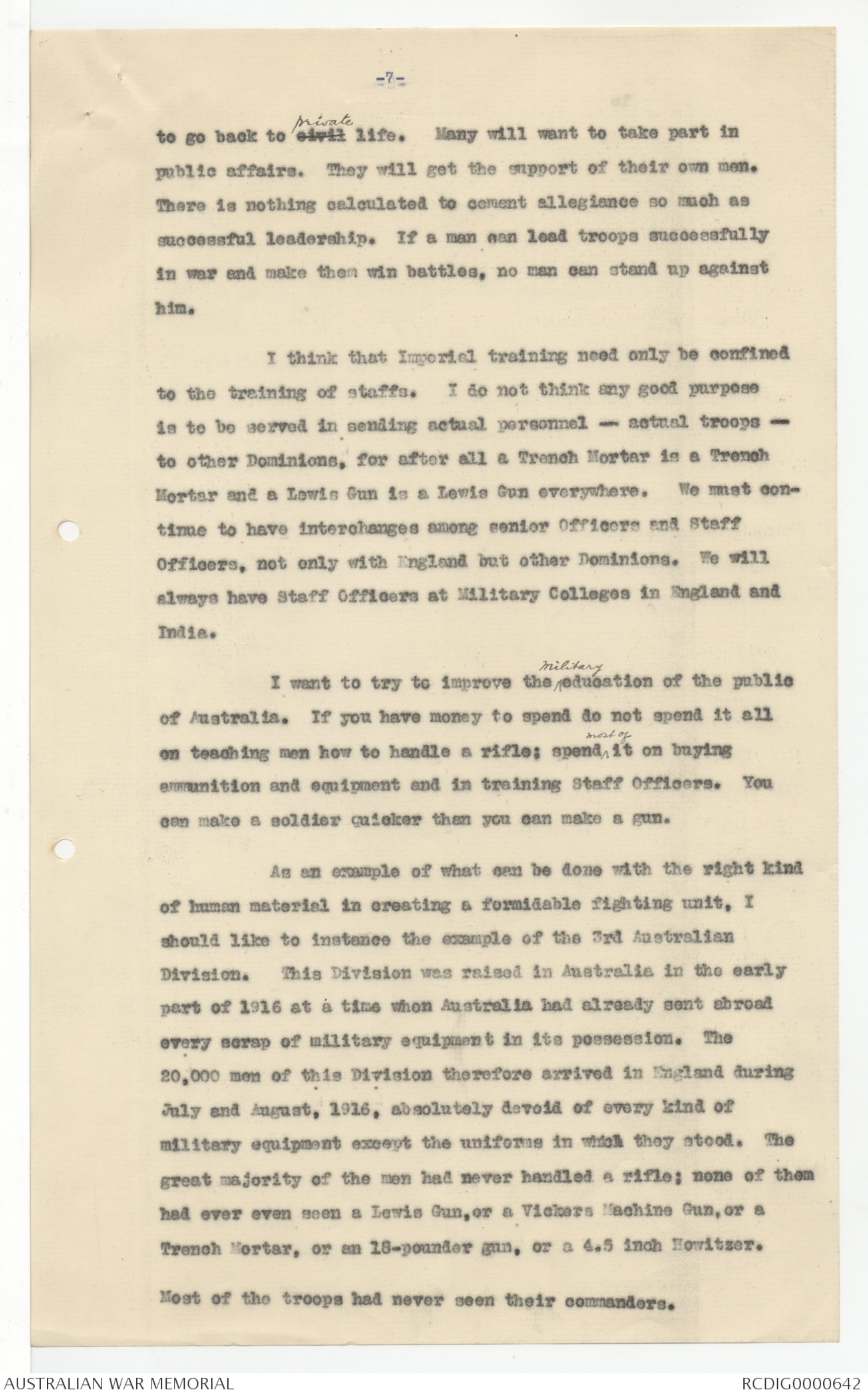
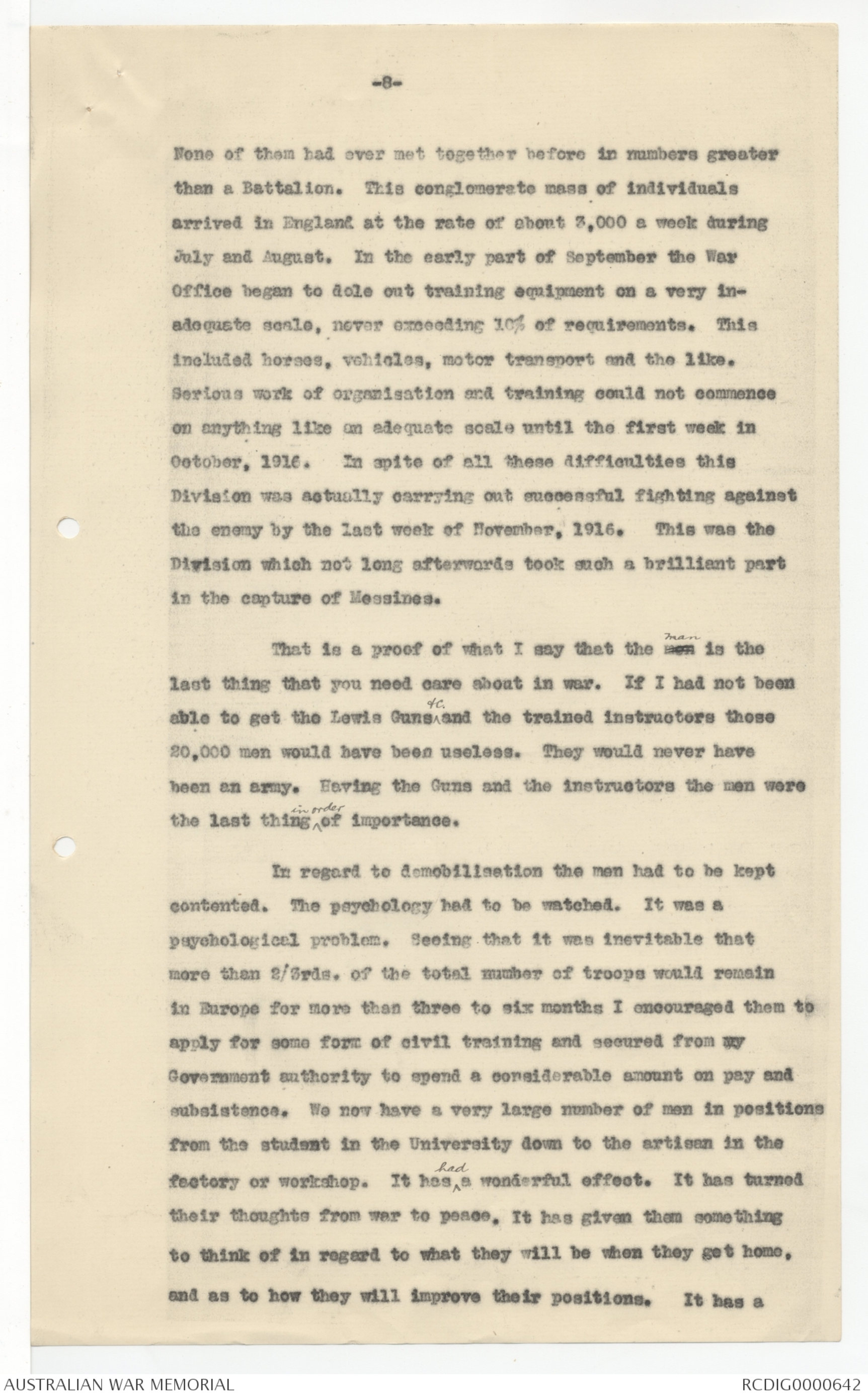
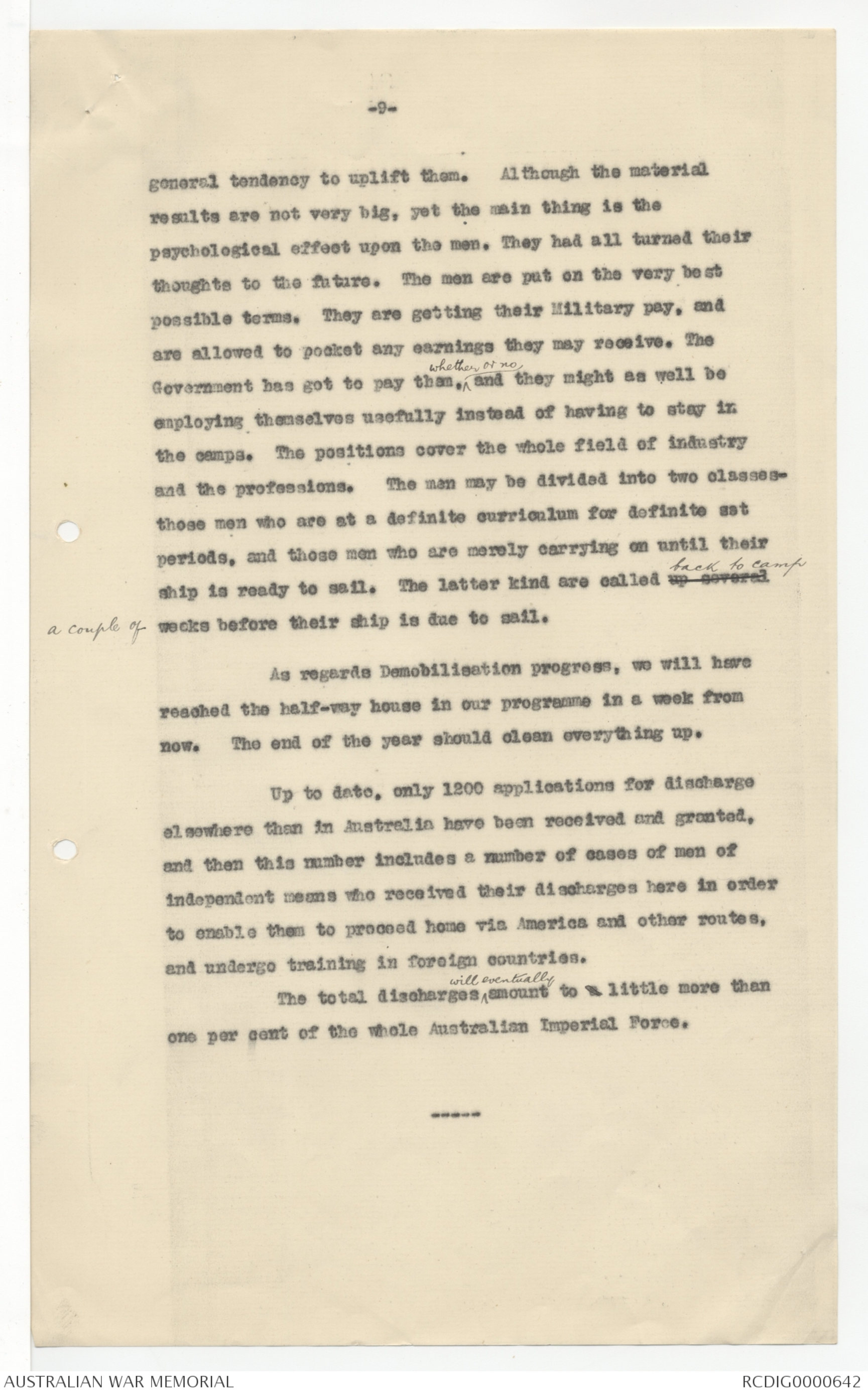
[*See OPF No 48
9/5/19
HIT
9/5/19*]
INTERVIEW WITH LIEUT-GENL. SIR JOHN MONASH.
G.C.M.G., K.C.B., V.D.
BY MR. H.K. ELLISON ON 8.5.19.
GENL. MONASH said:-
I am an enthusiast on the ^subject of the Australian soldier. I
have had experience of the Australian soldier for something
like 35 years in peace and in war. I have seen him as the
young volunteer in the Australian militia; I have seen him as
the more matured man who sticks to soldier training as a
hobby and as a pastime and out of patriotic motives. I have
seen him as the volunteer for war; I have seen him training for
war and I have seen him in war and battle. From every point
of view I have found him to rise to the occasion. I think
one might go a little bit behind that. I think that the
Australian ^nation has developed an extraordinary instinct for war.
By instinct for war I mean the aptitude and capacity of the
people for adapting themselves to the needs of war and the
correct public appreciation of the problems of war. For
example in a community or electorate people are apt to think
that all you want in war is a sufficient number of men. The
scientific soldier knows that is far from the truth. You want
equipment, you want a military spirit, and you want a trained
staff. The public of Australia, as a body of electors, have
always in my experience supported the most rational policy
of war preparation. Although you have always had small sections
of the community who have discounted expenditure upon what I may
call the more scientific side of war, the community as a whole
has always supported war preparation one high plane, recognising
the necessity for adequate expenditure on war equipment, and
on training on topography, intelligence and staff work. As a
small example we have a University - Sydney University - which
has a chair of Military Science. That is not intended to train
men as soldiers. It is intended to add to the educational
equipment of the citizen some knowledge of the science of war.
-2-
That is just es you teach a lawyer jurisprudence. It is
intended to teach them sound principles of the science of war.
In many ways the Australian community has exhibited as
instinct for war. in that way. Our public men have always
been supported by the electorate in their efforts to uplift
the military training and military preparation generally. The
result was that at the outbreak of this war we were ready with
a mobilisation scheme, with an adequate equipment for our lst
Division, a trained body of ∧ Regimental Officers end a trained body of
staff Officers. I say that the Australian people who have to
find pay the money, and who put into Parliament the right kind of
men, have always supported scientific military preparation.
We had at the outbreak of war a definite frame-work
and into that frame-work were able to fit the flower of our
manhood. ∧Of course it would have been no good having the frame-work
without the human material. The human material has been in every
way excellent.
An idea has got about - I hear it constantly - that
the Australian soldier is not disciplined. I believe that
arises partly from jealousy, - that people with prejudices
seize upon small evidences to base a case for Australian indiscipline.
For example, if there was a row in Cairo, - say, a
few Australians getting drunk, - they say "Look et them -
Australians"! Our critics have always been ready to seize on
small evidences which have been placarded in the press as
evidences of general indiscipline. I have found the Australian
soldier a particularly easy man to handle.
MR. ELLISON- Would an English General find the same?
GENL. MONASH: Well, hardly. The Australian soldier to
begin with, has enjoyed a very liberal and enlightened form of
education - a form of education which is in a majority of cases
free public education and which is chosen directed to developing character.
Unlike the compulsory education, and the education of most other
countries, which is chosen to teach the man by rote, the whole
-3-
of our education is fixed on the development of the child's
character. You get an enlightened, intelligent type.
Moreover, owing to the open-air conditions in Australia,
every youth is what you might call a handy man. If he has
got a home of his own he knows how to use a pick, a saw,
and a chisel. He has personal enterprise and adaptability.
He will find his job, tackle it, and solve it. A man who has
been accustomed to pottering about with tools, even though not
a tradesman, if given a Lewis Gun takes less than no time to
find out how to take it to pieces and to know it.
Another important quality is that he is an adept at
team work. He learns team work in the sports field and in the
Trades Union. He is educated to co-operative action. He knows
the necessity for team discipline. He knows that a body of men-
whether a football team of l8 or a Trades Union of 5,000 -
cannot achieve any good result without complying with the rules
and regulations. He does not do obey them because he likes them,
but because he knows they are a necessary part of organisation.
The Australian has an aptitude for military discipline. That
is only a means to an end. He approaches a task in war with a
full knowledge of the necessity of each individual man complying
with rules and regulations. Whether they relate to his bringing
his hand to the salute, or to the way he handles his rifle,
or as to how he stands in his ranks, it is all part and parcel
of the same thing. He accepts these things as a necessary part
of the plan of action. Supposing you take a couple of hundred
men and say they have to dig a trench. They xxx Each man is taught to carry
a shovel in his right hand and a pick in his left. When you
come to the place where the trench is to be dug, each man is
given his task to perform. I say, broadly, that I have met no
other body of men who lent themselves more readily to co-ordinated
action of that kind.
-4-
As regards the behaviour side of discipline, I, of
course, admit that in the Australian Army there are individual
cases of bad behaviour. They fall into two classes - the
merely military crime and the civil crime. The individual
crime in the Australian Imperial Force has been surprisingly
small.
Now we come to collective crimes, such as semi-mutiny
or riot. That invariably happens owing to the mishandling
of the men by some Officer. If men say "we will not go out
to-night" they probably have some grievance and have been mishandled.
Where cases have arisen, investigation has shown that
some senior Officer has bungled. Trouble arises from another
consideration. The Australian always wants to know why, and
if you tell him why be may grumble but will do it. If you don't
tell him why he generally draws his own conclusions and they
are generally wrong ones. There is no better example than our
demobilisation. It is a most difficult thing. Deprived as we
were of all ordinary civilised machinery - post office,
telegraph and everything had gone wrong, everything was
functioning badly - it was extremely difficult to handle the
men. I instituted from the beginning e policy of complete
candour. I told tell them quite frankly of the difficulties. I
bring them into the show and make them part and parcel of the
organisation. The result is that we have not had a row of any
kind in the Australian Imperial Force. Every other army has had
its bloodshed and riots. We have had none. Our men have
actually helped to quell the riots of other people.
If you take the men into your confidence ∧when you can they are
satisfied. You can't always do this in war, but you can say to
them "there is something doing to-night, boys. You must all be
in your billets. We can't tell you any more."
Reliance can be placed on the Australian to do his job
without supervision. A fine example is that of Paschendale
-5-
in 1917, where the conditions were the most horrible that
any army had to face - mud, and slush, and rain, and every
kind of stress and shellfire. The problem of supplying
the guns with ammunition was most difficult. The only way
to get it up was to give a man a couple of mules and panniers
end say "Your job is to carry ammunition from this dump to
the guns". You could not supervise his work ∧but you could
rely on him to carry on until he or his mules dropped dead.
Again, if you gave certain men the tucker for the rest of
their Company and told them "Here you are: here is the tucker;
take it to the men", they would rather die than not take it to
their comrades, even though they did not know where they were,
and had to search for their position.
RELATIONS BETWEEN AUSTRALIANS AND ENGLISH: I have a very
high opinion of the British effort, and a very high opinion
of some very fine Units- the British Cavalry, the Guards,
and the 29th and 51st Divisions. I also have a high opinion
of the quiet way in which the United Kingdom is returning to
peace conditions. I do believe it is going remarkably well.
From the point of view of the man in the ranks,
his personal experience of the British soldier by actual
contact in battle has been unsatisfactory. He takes a narrow
view. He only sees what is in front of his eyes. It has been
our bad luck to have had rotten troops with us. They have let
us down. An Australian never forgives being let down. A bad
case was that of Etinehem Spur which they failed to take, and
a mile of flank was left exposed. It did not take many hours
for that sort of thing to be talked about throughout the
whole five Divisions. That creates bad feeling.
From an industrial point of view, our men think
very badly of the British artisan, particularly his attitude
towards industrial problems. I am sorry to say that I think
the opinion of the A.I.F. of the Mother Country has fallen
instead of risen.
-6-
I do not think that feeling is shared by senior officers or
intellectual men. I think the Australian will go back to
Australia prouder of his own country than ever, both in the
abstract and in comparison with other countries.
We Australians think that we are not only a nation,
but a very formidable nation.
As regards the nationhood, it did not take many weeks
of war to dissipate anything in the nature of Interstate
jealousies. While we started from Australia saying "I am a
Victorian" or "I am a Tasmanian" that rapidly disappeared. We
rapidly became 'Aussies". It invariably happened that when
a person asked an Australian where he came from (meaning what
part of Australia) he would reply "From Australia".
I hope that the A.I.F. will be a very powerful
spiritual momentum in Australia in every way.
Australia has made very big sacrifices. Her casualties
comprised 60,000 dead and 200,000 wounded. What she will get out
of the was is e sense of nationhood. She will get a very greatly
enhanced confidence in herself, and will get a the spiritual momentum
given by the enlargement of view of something like 300,000 men
who have learnt to know the world and have gone through a wonderful
experience of life. The tradition of the A.l.F. is going to
be a wonderful thing. I am inclined to think that there will be
grow up a sort of schism of the men who did, and the men who
didn't. I think the A.I.F. will hang together, and will combine
for the achievement of a higher national efficiency. It is the
case of the man who knows, and the man who doesn't. Just imagine
a man on a farm who hasn't been over here arguing about the conditions
in France or England!! He knows nothing compared with the
man who has been and seen. They ∧latter will become a class by themselves.
There are a great many Officers who have decided enjoyed
authority and the pleasure of being an autocrat who will not want
-7-
to go back to civil private life. Many will want to take part in
public affairs. They will get the support of their own men.
There is nothing calculated to cement allegiance so much as
successful leadership. If a man can lead troops successfully
in war end make them win battles, no man can stand up against
him.
I think that Imperial training need only be confined
to the training of staffs. I do not think any good purpose
is to be served in sending actual personnel – actual troops -
to other Dominions, for after all a Trench Mortar is a Trench
Mortar and a Lewis Gun is a Lewis Gun everywhere. We mast continue
to have interchanges among senior Officers and Staff
Officers, not only with England but other Dominions. We will
always have staff Officers at Military Colleges in England and
India.
I want to try to improve the ∧military education of the public
of Australia. If you have money to spend do not spend it all
on teaching men how to handle a rifle; spend ∧most of it on buying
ammunition and equipment and in training staff Officers. You
can make a soldier quicker then you can make a gun.
As an example of what can be done with the right kind
of human material in creating a formidable fighting unit, I
should like to instance the example of the 3rd Australian
Division. This Division was raised in Australia in the early
part of 1916 at a time when Australia had already sent abroad
every scrap of military equipment in its possession. The
20,000 men of this Division therefore arrived in England during
July and August, 1916, absolutely devoid of every kind of
military equipment except the uniforms in which they stood. The
great majority of the men had never handled a rifle; none of them
had ever even seen a Lewis Gun, or a Vickers Machine Gun, or a
Trench Mortar, or an 18-pounder gun, or a 4.5 inch Howitzer.
Most of the troops had never seen their commanders.
-8-
None of them had ever met together before in numbers greater
than a Battalion. This conglomerate mass of individuals
arrived in England at the rate of about 3,000 a week during
July and August. In the early part of September the War
Office began to dole out training equipment on a very inadequate
scale, never exceeding 10% of requirements. This
included horses, vehicles, motor transport and the like.
Serious work of organisation and training could not commence
on anything like an adequate scale until the first week in
October, 1916. In spite of all these difficulties this
Division was actually carrying out successful fighting against
the enemy by the last week of November, 1916. This was the
Division which not long afterwards took such a brilliant part
in the capture of Messines.
That is a proof of what I say that the men man is the
last thing that you need care about in war. If I had not been
able to get the Lewis Guns &c and the trained instructors those
20,000 men would have been useless. They would never have
been an army. Having the Guns and the instructors the men were
the last thing ∧in order of importance.
In regard to demobilisation the men had to be kept
contented. The psychology had to be watched. It was a
psychological problem. Seeing that it was inevitable that
more than 2/3rds. of the total number of troops would remain
in Europe for more then three to six months I encouraged them to
apply for some form of civil training and secured from my
Government authority to spend a considerable amount on pay and
subsistence. We now have a very large number of men in positions
from the student in the University down to the artisan in the
factory or workshop. It has ∧had a wonderful effect. It has turned
their thoughts from war to peace. It has given them something
to think of in regard to what they will be when they get home,
end as to how they will improve their positions. It has a
-9-
general tendency to uplift them. Although the material
results are not very big, yet the main thing is the
psychological effect upon the men. They had all turned their
thoughts to the future. The men are put on the very best
possible terms. They are getting their Military pay, and
are allowed to pocket any earnings they may receive. The
Government has got to pay them, ∧whether or no and they might as well be
employing themselves usefully instead of having to stay in
the camps. The positions cover the whole field of industry
and the professions. The men may be divided into two classes¬
those men who are at a definite curriculum for definite set
periods, and those men who are merely carrying on until their
ship is ready to sail. The latter kind are called up several back to camp
weeks before their ship is due to sail.
As regards Demobilisation progress, we will have
reached the half-way house in our programme in a week from
now. The end of the year should clean everything up.
Up to date, only 1200 applications for discharge
elsewhere than in Australia have been received and granted,
and then this number includes a number of cases of men of
independent means who received their discharges here in order
to enable them to proceed home via America and other routes,
and undergo training in foreign countries.
The total discharges, ∧will eventually amount to a little more than
one per cent of the whole Australian Imperial Force.
 Sam scott
Sam scottThis transcription item is now locked to you for editing. To release the lock either Save your changes or Cancel.
This lock will be automatically released after 60 minutes of inactivity.